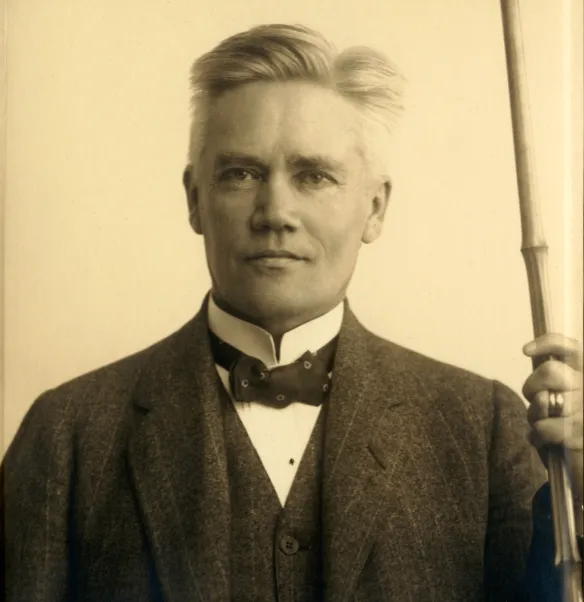
Herman Bernhard Lundborg
Herman Bernhard Lundborg: A Complex Legacy in Genetics and Eugenics
Herman Bernhard Lundborg, born on July 19, 1868, in Vänersborg, Sweden, was a pioneering figure in early human genetics and a prominent advocate of eugenics. He is remembered for his controversial work and views that have sparked debates on ethics and scientific responsibility. Lundborg’s life, marked by academic achievements and contentious ideologies, provides a window into the evolution of genetics and its intersection with social policies in the early 20th century.
Education and Early Career
Lundborg’s academic journey began at Uppsala University, where he earned his doctorate in medicine in 1892. With a deep interest in genetics, he pursued a career in neurology and psychiatry, becoming a professor at his alma mater. His research interests eventually led him to focus on epilepsy and hereditary conditions, areas that were central to his views on human genetics and eugenics.
In 1909, Lundborg founded the Swedish Society for Racial Hygiene, a precursor to his later work as director of the State Institute for Racial Biology in Uppsala, where he served from 1922 to 1935. During his tenure, he advocated for policies aimed at improving what he saw as the “genetic quality” of the Swedish population, promoting sterilization programs and other measures to prevent what he deemed undesirable traits from being passed on.
Contributions to Genetics and Eugenics
Lundborg was one of the early pioneers in human genetics, conducting detailed studies on heredity and advocating for what he termed “racial hygiene,” a belief in improving the genetic profile of the population through selective breeding and public health policies. His research often involved pedigree studies that mapped hereditary traits and traced the transmission of genetic conditions, including epilepsy. His work contributed foundational insights into genetics and hereditary conditions, but his eugenics-focused approach has since been met with significant ethical criticism.
A strong advocate for eugenics, Lundborg’s views aligned with other European and American eugenicists of the era. He promoted sterilization programs and other policies aimed at preventing the inheritance of certain genetic traits, which led to collaborations with eugenicists worldwide. While his work influenced early genetic research, it is marred by his advocacy for policies that have been widely condemned for their ethical implications and harm to individuals targeted by such policies.
Epilepsy Research and Genetic Studies
In addition to his work in eugenics, Lundborg made substantial contributions to the study of epilepsy, focusing on its genetic components. He conducted clinical studies and documented numerous case studies, attempting to trace hereditary patterns in epilepsy. His early theories about the genetic transmission of epilepsy laid groundwork for future studies in neurology and genetics. Though his methods and interpretations were influenced by his eugenics perspective, his epilepsy research provided insights that contributed to the evolving understanding of the disorder’s genetic underpinnings.
Personal Interests and Mentorship
Outside of his professional life, Lundborg had a wide range of personal interests. An avid photographer, he documented his research and personal life through photographs, capturing not only his scientific observations but also his love for nature and environmental conservation. He enjoyed gardening, classical music, and art, and was a dedicated reader of scientific literature and philosophy. His travels for research took him across Europe, where he studied diverse populations, particularly the Sami people in Scandinavia, contributing to his anthropological work.
Lundborg was also a mentor to many young scientists and researchers, influencing future generations in neurology and genetics. Known for his passion for lecturing, he often presented his views on genetics and eugenics in both academic and public settings. He engaged actively in ethical debates, defending his stance on eugenics, which has left a lasting impact on his legacy.
A Controversial Legacy
Herman Lundborg passed away on May 9, 1943, in Uppsala, Sweden. His work, particularly in the field of eugenics, has made him a contentious figure in the history of genetics. While his contributions to genetics and epilepsy research provided early insights into heredity, his advocacy for eugenics and “racial hygiene” policies casts a shadow over his legacy.
Today, Lundborg’s research is viewed through a critical lens, with many ethical debates about his work and the broader implications of eugenics. His establishment of the State Institute for Racial Biology is remembered as part of a darker chapter in the history of genetics, leading to a reassessment of his legacy. Despite the controversies, his contributions remain a significant part of the historical context of genetics, offering a complex portrait of a man whose scientific work was inseparable from his ideological beliefs.
Lundborg’s legacy serves as a reminder of the importance of ethical considerations in scientific research, especially in fields that have far-reaching social implications. His contributions to early genetics and eugenics are a testament to the power—and potential dangers—of scientific influence on public policy and societal values.
